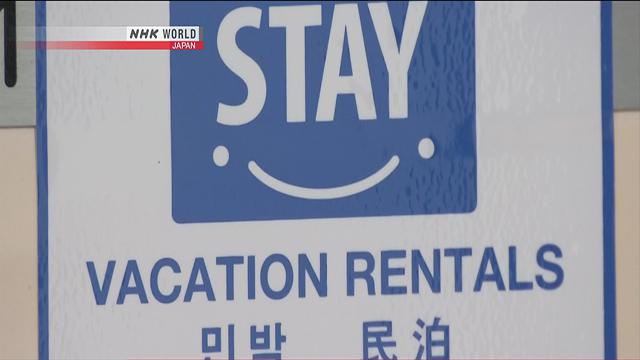For some people, renting out their homes is a source of income. And the business is becoming more popular. Foreign visitors are increasingly looking to this type of accommodation instead of hotels because of low cost and ease of booking.
The new law will essentially allow anyone to run such a business, as long as they register with the appropriate government office. Municipalities across the country started accepting applications on March 15th.
One person who applied at a Tokyo ward office says he plans to rent out a room in his two-story house. He wants lots of people to visit his country and enjoy the things it has to offer.
Before the law, there were no concrete rules overseeing the short-term lodging business. But, with the 2020 Tokyo Olympics and Paralympics ahead, it is believed that demand for such facilities is likely to increase.
Unregistered short-term lodgings are being rented throughout the country. In 2016, the government surveyed over 15,000 private room rentals listed online. 80 percent were either unauthorized or had unconfirmed owners.
These unauthorized lodgings have been the source of serious concerns. Last month, police discovered the dismembered body parts of a tourist at an apartment in Osaka.
Some buildings have started banning the business. Residents are worried about noise and strangers coming and going.
Visiting an unregistered apartment
An NHK reporter visited an unregistered apartment in Tokyo that was listed online.
A family of foreigners was staying at an apartment in the building. They said they were from the Philippines and had found the place online.
They said the apartment came recommended by a friend, who said it was like staying at a hotel. They said the rate was about 165 dollars a week.
But the apartment is not registered. The family said they did not meet the owner of the apartment when they arrived.
They said they had to use their phones to look up how to open the front door, and that it took over an hour to get in.
A building resident says she started seeing strangers last year. Around the same time, she began noticing small boxes on door knobs. It's believed that they contain room keys.
She says she sees garbage left outside, and has concerns about how cigarettes are disposed. She says no one ever told her that some units were being rented out.
Another resident says she had a scary experience. She says she heard someone trying to open her door. When she looked through the peephole, she says she saw a stranger. She moved in only 4 months ago, but has started searching for another place.
NHK asked the municipality about the building. An officer says they got word of illegal private lodgings here three years ago, and investigated. He says he thought they had solved the problem, and is surprised to hear otherwise. He says they will look into it.
Motonobu Nakagomi runs a business investigating cases of illegal short-term lodging.
He says the operators keep coming up with new tactics. In one case, the key boxes were attached to bicycles. Since a bicycle is an individual's property, landlords cannot remove the box, which they could do if it was on a doorknob.
He also says manuals left for visitors advise them to say they are friends of a resident if asked by a neighbor.
Nakagomi says the biggest challenge is finding who operates the lodging services. Since they rent out ordinary rooms and houses, the operators are difficult to get in touch with.
Laying down the law
The new legislation was introduced in part to address resident concerns. Now, people who want to rent out their rooms will have to register with local municipalities and other parties. And businesses that manage the rooms will have to register with the land and transport ministry. They will be required to put up clearly visible signs on doors letting neighbors know that strangers moving in-and-out are renting the rooms.
The law also addresses concerns about who will stay in the rooms. It stipulates that people renting out rooms must confirm the identities of guests by requiring passports or other documents.
The law also tackles noise and visitor behavior. It requires managers to explain community rules and other details to guests in advance to avoid problems with residents.
Other rules include that the rooms must be cleaned regularly and capping the number of days used for lodging at 180 days a year.
Will resident concerns be allayed?
Motonobu Nakagomi, who runs the investigative business, says when the new law takes effect, illegal operators will have two choices: register, or withdraw from business. Illegal operators will, in theory, be forced out.
He thinks regulating online intermediaries is effective. The world's largest online agent, Airbnb, has announced that from June it won't allow unregistered operators to list properties on its website.
But Nakagomi says there are hundreds of similar websites. He says not all of them use registration and there is no guarantee that the rooms listed are properly managed. He says stamping out illegal private lodging services might be easier said than done.
